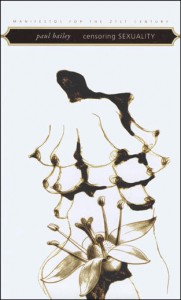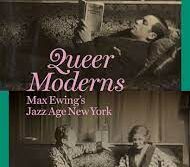 Censoring Sexuality: Poulenc’s Priest
Censoring Sexuality: Poulenc’s Priest
by Paul Bailey
Seagull Books. 147 pages, $16.95
THE HEART of this little book is a 72-page essay, Poulenc’s Priest, by the British novelist Paul Bailey. The title stems from an anecdote about the gay composer Francis Poulenc that appeals to Bailey’s “sense of what is right and wrong”: “[Poulenc] confessed to his priest that he’d had a sexual encounter in a park with a stranger, and the priest—exasperated—stopped him short with the admonition: ‘Stop wasting our time. If you have to confess, plead guilty to a real sin like pride or cruelty. Now go away.’” Bailey’s essay ranges far and wide, but for the most part deals with situations in which gay men have been forced to conceal—or have chosen not to conceal—their sexual identity. It provides examples of intolerance and sometimes, as in the Poulenc’s priest anecdote, unexpected acceptance.
In 1953, John Gielgud—then 49, newly knighted, and one of the foremost Shakespearean actors of the 20th century—was arrested and fined £20 for “importuning in a public lavatory.” Denounced in newspaper editorials and in the House of Lords, Gielgud experienced intense humiliation and shame, and contemplated suicide. However, the theatre-going public was on his side. Bailey recounts attending a performance at London’s Theatre Royal: “When the actor stepped on to the stage the entire audience rose to its feet and applauded him steadily for several minutes.” Bailey devotes nearly a dozen pages to the gay Russian writer Mikhail Kuzmin (1872–1936), who “from the mid-1890’s until the 1930’s … had lived without sexual deceit or camouflage”—that is, both before and after the Communist Revolution of 1917. Bailey greatly admires Kuzmin’s 1906 novel Wings, to which he wrote a brief foreword in the translation by Hugh Aplin (Hesperus Press, 2007)—though I must add that the Aplin translation is far less idiomatic and readable than the earlier one by Neil Granoien and Michael Green (Ardis Publishers, 1972). Despite the high esteem in which Bailey holds Wings, he fails fully to appreciate its historical importance as a pro-gay polemic. Episodic, consisting entirely of vignettes, Wings doesn’t merely defend but celebrates male love from the standpoints of æstheticism and Hellenism. The key passage in Wings, a soliloquy by the gay mentor Stroop, is much influenced by the ideas of Walter Pater, John Addington Symonds, and Oscar Wilde. It begins: “We are Hellenes: the intolerant monotheism of the Hebrews is alien to us—their rejection of the visual arts, their slavish attachment to the flesh, to the getting of heirs, to seed.” Stroop proceeds to attack the Christian dogma that same-sex acts are unnatural. Then, echoing the ideas of Pater, he declares: “People go about like the blind, like the dead, when they might create for themselves a life burning with intensity in every moment, a life in which pleasure would be as poignant as if you had just come into the world and might die before the day were done. It is with such greed that we must fling ourselves upon life.” Stroop concludes with an ecstatic vision: “Somewhere lies our ancient kingdom, full of sunlight and freedom, of beautiful and courageous people, and thither we sail, my argonauts, over many a sea, through mist and darkness. And in things yet unheard we shall descry ancient roots, in glittering visions yet unseen we shall know our own dear land!” (Translations by Granoien and Green.) Bailey compares the greatest poems of Kuzmin to those of Constantine Cavafy, “whose celebrations of male beauty are bracingly free from shame and guilt.” In addition to the men already mentioned, Bailey touches upon the lives and work of A. E. Housman, Marcel Proust, Francis Bacon, Quentin Crisp, Fred Barnes, Noël Coward, and Terence Rattigan. Throughout, he invidiously compares the openness of Kuzmin, Cavafy, Barnes, and Crisp to such relatively closeted men as Housman, Proust, and Coward: “I hope I have suggested that the way Mikhail Kuzmin lived is preferable, and more beneficial to the people around him, than the subterfuge Proust resorted to or the self-destructive promiscuity that sustained Bacon’s muse.” Having said this, Bailey later informs us that the novels he himself has written “are not especially gay because so many of the characters aren’t.” Baptized into the Anglican Church, Bailey hopes for a day when everyone would “live and let live, as Christ would have us do.” That would be nice, but an infidel like me must add that some sayings of Jesus advocate tolerance, while others do not, and that, at any rate, it is far from certain that he ever existed as anything more than a legendary figure. Bailey is simply wrong when he states: “It is required by the world’s religions that sex outside marriage and sex between men and men and women and women have to cause offense to the believers who were raised in the fine art of being offended.” By “world religions” he really means the Abrahamic faiths. One can hardly say that the Olympian religion of ancient Greece is opposed to sex between men, since the gods themselves often have male lovers. The rest of the book is largely filler. The most interesting bit is a five-page excerpt from “Concerning Beautiful Clarity” by Mikhail Kuzmin. There are several articles from the “Gay and Arab” section of the March 2005 issue of Index on Censorship. These read very much like anti-Arab propaganda and are unrelated to either Bailey’s essay or the topic of censorship. What is described in these articles may or may not be true. I choose to suspend judgment. Bailey concludes with the assertion:“There is much more to a person’s life than being heterosexual or homosexual.” Well, yes—but men and women are still not free to love others of their own sex. The task of liberating sexuality is still before us. While there are felicitous insights in Bailey’s essay, it is not really about censorship. Nor is it a manifesto, as implied on a jacket blurb. It is a modest, rather personal, well-written essay, neither more, nor less. John Lauritsen’s most recent book is The Man Who Wrote Frankenstein (Pagan Press Books, 2007).




